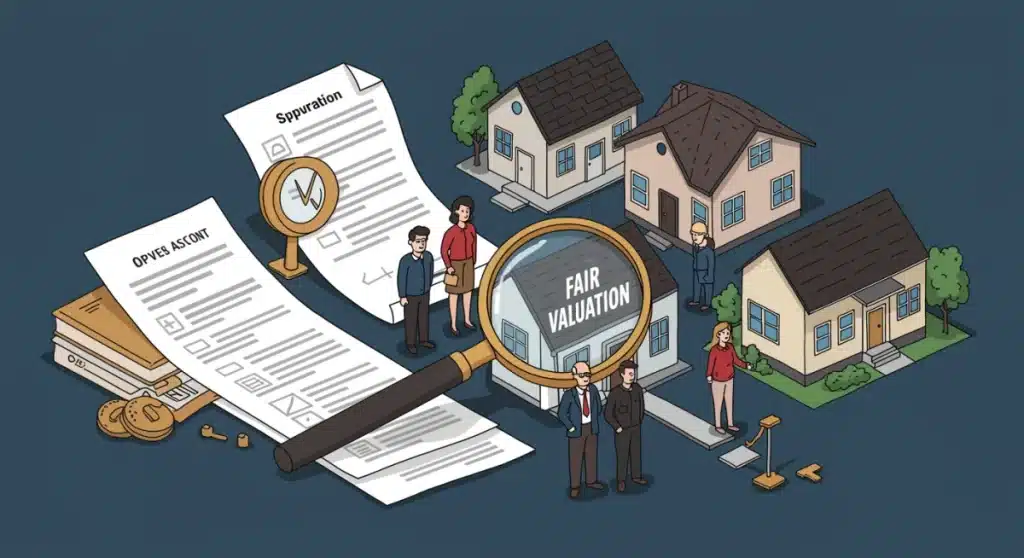Appraisal Bias Regulations 2025: Protecting Consumers

New federal measures are set to implement comprehensive appraisal bias regulations 2025, aiming to eradicate discriminatory valuations and foster equitable housing opportunities across the United States, representing a significant stride in consumer protection.
The landscape of real estate valuation is on the cusp of a significant transformation as new and stricter appraisal bias regulations 2025 are introduced, fundamentally reshaping how properties are assessed across the United States. This pivotal shift is designed to dismantle long-standing systemic issues of discrimination in property appraisals, ensuring fair and equitable valuations for all consumers, regardless of their background or the demographic makeup of their neighborhoods. These upcoming regulations represent a concerted effort by federal agencies and housing advocates to address historical injustices and build a more transparent and just housing market, directly impacting homeowners, prospective buyers, lenders, and appraisers alike. The impending changes are not merely procedural; they are a profound statement on the commitment to fair housing and economic equity, promising to usher in an era where property values truly reflect market conditions rather than biased perceptions. This article delves into the specifics of these regulations, exploring their origins, their projected impact on various stakeholders, and the anticipated mechanisms for their implementation and enforcement. Understanding these changes is crucial for anyone involved in the real estate sector, as they will redefine best practices and accountability standards. The push for these regulations stems from a growing recognition of how appraisal bias has perpetuated wealth disparities and limited access to homeownership for minority communities, highlighting the urgent need for robust protective measures. As the 2025 deadline approaches, stakeholders are preparing for a new operational paradigm that prioritizes fairness, accuracy, and equal opportunity in every appraisal. The implications extend beyond individual transactions, aiming to stabilize local housing markets and foster community development by ensuring that all properties are valued equitably. This comprehensive overview provides a clear understanding of the regulatory framework and its potential to foster a more inclusive real estate environment, emphasizing what readers need to know now to navigate these evolving requirements effectively. The goal is to create a robust system where every appraisal is free from prejudice, reflecting a property’s true worth and supporting the financial well-being of all homeowners.
Understanding the Genesis of New Appraisal Bias Regulations 2025
The push for the appraisal bias regulations 2025 stems from decades of documented evidence revealing discriminatory practices within the real estate appraisal industry. These practices have historically led to undervalued homes in minority neighborhoods, perpetuating wealth gaps and denying equitable opportunities. Federal agencies, civil rights organizations, and consumer advocacy groups have tirelessly campaigned for reforms to address these systemic issues, culminating in the comprehensive regulatory framework now set to take effect. The origins of these regulations are deeply rooted in the broader movement for fair housing and economic justice, recognizing that a home’s appraisal significantly impacts a family’s financial future and community stability. The collective effort highlights a growing national consensus that unbiased valuations are fundamental to a fair and equitable housing market, providing a clearer path for historically marginalized communities to build generational wealth.
Historical Context of Appraisal Discrimination
-
Redlining’s Legacy: Decades of redlining policies created segregated housing markets, with appraisals often reflecting racial bias rather than objective property values.
-
Predatory Lending Practices: Discriminatory appraisals often accompanied predatory lending, trapping minority homeowners in cycles of debt and preventing wealth accumulation.
-
Recent Studies and Data: Contemporary research continues to expose persistent racial and ethnic disparities in home valuations, underscoring the ongoing need for intervention.
These new regulations are not merely a response to isolated incidents but a comprehensive effort to dismantle deeply entrenched biases. They aim to create a system where property values are determined by objective criteria, free from the influence of race, ethnicity, or other protected characteristics. The historical narrative clearly demonstrates that previous attempts at reform have fallen short, necessitating a more robust and enforceable set of rules. This proactive approach is designed to ensure that the next generation of homeowners does not face the same discriminatory hurdles that have plagued communities for too long. The regulatory journey reflects a societal commitment to rectify past wrongs and forge a more inclusive future for all. This foundational understanding is crucial for appreciating the depth and necessity of the impending changes, setting the stage for a fairer appraisal process nationwide.
Key Provisions of the Appraisal Bias Regulations 2025
The forthcoming appraisal bias regulations 2025 introduce several critical provisions designed to enhance fairness, transparency, and accountability within the appraisal process. These provisions are multifaceted, addressing various aspects from appraiser qualifications and training to review mechanisms and enforcement. A central tenet of the new regulations is the emphasis on objective data and standardized methodologies, reducing the subjective elements that have historically opened doors to bias. The regulations specifically mandate enhanced data collection and reporting requirements, which will allow for better monitoring and identification of potential discriminatory patterns. Furthermore, there will be a strong focus on appraiser education, ensuring that professionals are well-versed in fair housing laws and implicit bias awareness. This holistic approach aims to create a more robust and equitable system for all participants in the real estate market, fostering trust and integrity in property valuations. The regulations are poised to create a level playing field, where a property’s worth is solely determined by its intrinsic value and market conditions.
Mandatory Training and Certification for Appraisers
-
Bias Awareness Programs: Appraisers will be required to complete regular training on identifying and mitigating implicit and explicit biases.
-
Cultural Competency: Education will extend to understanding diverse community dynamics and their impact on property values, ensuring a more nuanced approach.
-
Enhanced Certification Standards: Stricter requirements for licensing and ongoing professional development will be implemented to elevate industry standards.
Another significant provision involves strengthening the review process for appraisals, allowing for independent third-party evaluations in cases where bias is suspected. This added layer of scrutiny aims to catch and correct discriminatory valuations before they negatively impact consumers. The regulations also outline clear procedures for consumers to challenge appraisals they believe are biased, providing a much-needed recourse for those who feel unfairly treated. The implementation of these provisions is expected to reduce the incidence of undervalued homes in certain communities, thereby promoting economic equity and providing a clearer path to wealth building. These measures represent a proactive step toward ensuring that all appraisals are conducted with the highest degree of integrity and fairness, ultimately benefiting the entire housing ecosystem. The comprehensive nature of these changes signifies a strong commitment to eradicating bias from the appraisal industry, setting a new benchmark for ethical practices.
Impact on Homeowners and Prospective Buyers
The implementation of the appraisal bias regulations 2025 is expected to have a profoundly positive impact on both current homeowners and prospective buyers, particularly those from historically marginalized communities. For homeowners, these regulations mean a greater likelihood of receiving fair and accurate valuations, which can significantly affect refinancing options, home equity loans, and the eventual sale price of their property. Undervalued appraisals have long been a barrier to wealth accumulation, and these new rules aim to dismantle that barrier, ensuring that home equity truly reflects market value. This is especially crucial for individuals who have previously faced challenges due to biased assessments, as it provides a pathway to unlocking the full financial potential of their homes. The regulations will help homeowners secure better loan terms and build stronger financial foundations, fostering economic stability and growth within their communities. The increased transparency and accountability fostered by these rules will also empower homeowners with more confidence in the appraisal process, knowing that their property will be judged on its merits rather than on discriminatory factors.
Prospective buyers, especially those from diverse backgrounds, will also benefit immensely from these new regulations. A fair appraisal process ensures that they are not overpaying for homes due to inflated valuations in certain areas or, conversely, that they are not unfairly denied access to loans due to undervalued properties in their desired neighborhoods. This creates a more level playing field, making homeownership more accessible and equitable across all demographics. The regulations will help to reduce the financial hurdles that have traditionally hindered minority groups from entering the housing market, thereby promoting greater diversity in homeownership. Moreover, the enhanced transparency will equip buyers with greater confidence in the integrity of their property transactions, knowing that the appraised value is a true reflection of the market. These changes are designed to foster an environment where every potential homeowner has an equal opportunity to achieve their dream of property ownership, contributing to more inclusive and vibrant communities. The long-term effects are anticipated to include reduced housing disparities and increased opportunities for intergenerational wealth transfer, strengthening the economic fabric of the nation.

Implications for Lenders and Real Estate Professionals
Lenders and real estate professionals will experience significant operational adjustments with the advent of the appraisal bias regulations 2025. For lenders, the new rules necessitate a re-evaluation of their appraisal management processes, including how they select, monitor, and review appraisers. There will be increased pressure to ensure that their appraisal panels are diverse and that all appraisals comply with the new anti-bias mandates. This means investing in new technologies for data analysis to detect potential bias, and refining internal compliance protocols to meet stricter regulatory oversight. Lenders will also need to collaborate more closely with appraisal management companies (AMCs) to ensure that appraisers are adequately trained and adhere to the updated standards. The goal is to minimize risks associated with biased appraisals, which can lead to legal challenges and reputational damage. This proactive approach will protect both consumers and the financial institutions responsible for facilitating homeownership, ensuring that lending practices are fair and equitable. The regulatory shift demands a robust commitment to systemic change within the lending industry, fostering an environment of trust and accountability.
Operational Changes for Real Estate Agents
-
Client Education: Agents will need to educate clients on their rights regarding fair appraisals and how to challenge potentially biased valuations.
-
Market Awareness: A deeper understanding of hyper-local market dynamics and historical appraisal trends will be crucial to advocating for clients.
-
Collaboration with Appraisers: Agents may engage more constructively with appraisers, providing objective data to support accurate property valuations without influencing bias.
Real estate agents will find themselves playing a more active role in ensuring fair valuations for their clients. They will need to be well-versed in the new regulations to effectively advise buyers and sellers, particularly when an appraisal comes in lower than expected. This includes understanding the process for filing a reconsideration of value or a formal complaint if bias is suspected. The regulations also encourage greater transparency in communication between agents, appraisers, and clients, fostering a more collaborative environment aimed at achieving fair outcomes. Compliance with these regulations will not only mitigate legal risks for real estate professionals but also enhance their reputation as trusted advisors who prioritize their clients’ best interests and promote equitable housing. The industry is evolving to demand higher ethical standards and a deeper commitment to fairness, ensuring that all transactions are conducted with integrity. This comprehensive adaptation will ultimately strengthen the real estate market as a whole, benefiting all stakeholders involved.
Challenges and Opportunities in Implementing New Appraisal Bias Regulations 2025
Implementing the appraisal bias regulations 2025 presents a unique set of challenges and significant opportunities for the entire real estate ecosystem. One primary challenge lies in the sheer scale of retraining and re-educating a vast network of appraisers across the country. Ensuring consistent understanding and application of the new anti-bias protocols will require substantial investment in resources and time. Another hurdle is developing robust data collection and analysis systems capable of effectively identifying and flagging potential biases without creating undue administrative burdens. The industry must also navigate the delicate balance of enforcing strict regulations while avoiding unintended consequences that could slow down the appraisal process or reduce the availability of qualified appraisers. Additionally, there’s the challenge of overcoming ingrained industry practices and mindsets that may resist change, requiring strong leadership and consistent enforcement. These are not minor adjustments but a fundamental shift in operational philosophy, demanding a concerted effort from all stakeholders. However, addressing these challenges will pave the way for a more equitable and efficient housing market.
Opportunities for Innovation and Growth
-
Technological Advancements: The regulations can spur innovation in AI and machine learning tools to assist in bias detection and ensure objective data analysis.
-
Enhanced Professional Standards: Elevated training and certification requirements will lead to a more skilled and credible appraisal workforce, boosting public trust.
-
New Business Models: Opportunities may arise for specialized firms offering bias auditing, compliance consulting, and fair valuation services.
Despite the challenges, these regulations open doors to substantial opportunities. By mandating fair practices, the regulations will foster greater consumer confidence in the appraisal process, potentially leading to a more stable and predictable housing market. This stability benefits lenders, as it reduces risks associated with inaccurate valuations, and it benefits real estate professionals by creating a more trustworthy environment for transactions. Furthermore, the focus on data-driven appraisals encourages the adoption of advanced technologies, pushing the industry towards greater efficiency and accuracy. The emphasis on diversity and inclusion within the appraiser workforce can also lead to a richer understanding of diverse communities, resulting in more accurate and culturally sensitive valuations. Ultimately, these regulations represent an opportunity to build a healthier, more equitable housing market that serves all Americans, driving long-term economic growth and social justice. The shift will reward those who embrace change and commit to ethical practices, setting a new precedent for the industry.

Enforcement and Consumer Recourse Under the 2025 Regulations
The efficacy of the appraisal bias regulations 2025 hinges significantly on robust enforcement mechanisms and clear pathways for consumer recourse. Federal and state regulatory bodies will play a pivotal role in overseeing compliance, conducting audits, and investigating complaints related to appraisal bias. These agencies are expected to employ a combination of proactive monitoring and reactive investigations to ensure adherence to the new standards. Penalties for non-compliance will be significant, ranging from fines and license suspensions for individual appraisers and firms to more severe sanctions for lenders and AMCs that fail to implement adequate anti-bias controls. This stringent enforcement approach is designed to deter discriminatory practices and hold all parties accountable. The emphasis on enforcement underscores the seriousness with which these regulations are being introduced, aiming to create a real and lasting change in industry behavior. Consumers will have clear avenues to report suspected bias, knowing that their complaints will be thoroughly investigated and acted upon. This will foster a sense of security and trust in the appraisal process, empowering individuals to challenge unfair valuations without fear of retaliation.
A crucial aspect of these regulations is the establishment of accessible and transparent consumer recourse channels. Individuals who believe their appraisal has been influenced by bias will have the right to challenge the valuation through a defined process. This typically involves filing a complaint with the appropriate regulatory body, which will then initiate an investigation. The regulations are expected to mandate specific timelines for responding to consumer complaints and for resolving disputes, ensuring that issues are addressed promptly and fairly. This empowers consumers with the tools and information necessary to protect their financial interests and uphold their rights to fair housing. Furthermore, the regulations may encourage or require the use of independent review panels to re-evaluate appraisals in question, providing an impartial assessment. This multi-layered approach to enforcement and recourse is designed to create a powerful deterrent against bias and provide effective remedies for those who are harmed by discriminatory valuations. The ultimate goal is to build a system where accountability is paramount and every consumer can trust the integrity of their home appraisal, solidifying fair practices across the board. This commitment to justice ensures that the regulations have a tangible and positive impact on individuals and communities.
Key Feature |
Brief Description > |
|---|---|
Mandatory Training |
Appraisers must complete bias awareness and cultural competency training. |
Consumer Recourse |
Clear processes for challenging biased appraisals and filing complaints. |
Enhanced Oversight |
Stricter federal and state regulatory monitoring and enforcement. |
Data Transparency |
Increased data collection and reporting to identify discriminatory patterns. |
Frequently Asked Questions About Appraisal Bias Regulations 2025
▼
These are comprehensive federal rules aimed at eliminating discriminatory practices in property valuations. They mandate new training, enhance oversight, and establish clear consumer recourse mechanisms to ensure fair appraisals across the United States, promoting equitable housing opportunities for all citizens.
▼
The regulations are designed to ensure your home’s value is based purely on objective market conditions, free from bias. This could lead to fairer, potentially higher valuations, especially in communities historically affected by undervaluation, enhancing your home equity and financial stability.
▼
Under the new regulations, you will have clear avenues to challenge an appraisal. This typically involves filing a complaint with relevant regulatory bodies, who will then investigate. Documentation and prompt action are key to addressing potential bias effectively, ensuring your rights are protected.
▼
Yes, a key provision includes mandatory training for appraisers on bias awareness and cultural competency. This ensures they are equipped to conduct valuations objectively, understanding diverse community dynamics and adhering to fair housing laws, thereby elevating industry standards significantly.
▼
The new appraisal bias regulations 2025 are scheduled to take full effect in 2025. While specifics on exact dates are being finalized, the industry is already preparing for implementation, making it crucial for all stakeholders to stay informed and adapt to the impending changes.
What this means
The impending appraisal bias regulations 2025 signal a fundamental shift towards a more equitable and transparent housing market in the United States. This transformative initiative is not merely about procedural updates; it’s about addressing historical inequities and fostering economic justice for all. As these regulations draw closer to implementation, stakeholders from homeowners to lenders must prepare for a new era of accountability and fairness. The long-term implications include increased stability in property values, greater access to homeownership for underserved communities, and a renewed trust in the integrity of the appraisal process. This represents a critical step forward in ensuring that a home’s value truly reflects its worth, free from discriminatory influences, and sets a precedent for future consumer protection efforts in real estate. The impact will resonate across the entire real estate landscape, demanding vigilance and adaptation from all involved parties.





